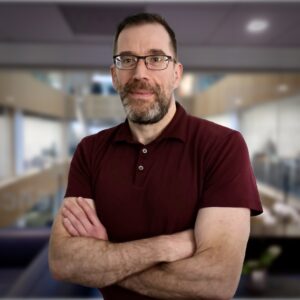UChicago CS: Computing on the Edges
 Our department was originally founded with a strong emphasis on solving the hardest problems at the cutting edge of theoretical computer science.
Our department was originally founded with a strong emphasis on solving the hardest problems at the cutting edge of theoretical computer science.
Twelve years ago, we embarked on a mission to become a top systems department by hiring people who saw what was beyond the edges of today’s most important systems problems: complexity, environmental impact, security, resilience, programmability, adaptivity, energy, and massive scale for hardware, software, and data.
Over the last seven years we have grown massively (from 18 faculty in 2012 to 51 in 2024), fusing together brilliant minds to create a new vision for solving those problems. At each edge of this vision, multiple disciplines meet and new discoveries create novel structure that elevates and projects a once 2D mindset into higher dimensions:
-
- Computing and people: where human behavior and education interact with computing and robotics
- Computational Science: where AI/ML and computing meet physics, chemistry, and biology
- Quantum Computing: where computational methods and theory meet physics
- Computing and policy: where the rapidly changing computing landscape interacts with society and equity
- Computing and the environment: beyond energy efficiency, the interaction between computing and sustainability
- Computing for ML and ML for computing: how to design better computing systems using ML and, in turn, design better computing systems for ML
- AI and social science: how to responsibly deploy AI when “ground truth” is a social construct with all its inherent biases
- AI and art: how to use AI to create while protecting human creators from AI
I intend to continue working towards the mission we set out on twelve years ago, by hiring visionaries who not only refine the edges of these known interdisciplinary planes of computer science but also push farther into undiscovered aggregations. True interdisciplinary work is demanding and often requires orienting yourself—and others—in multiple dimensions to change the way people in multiple fields think. This provides immense value and will always be rewarded within our department.
At its most fundamental level, computing at the University of Chicago is defined by those who are cutting new edges; we build beyond traditional areas of computing, connect disparate disciplines, and intersect with all other aspects of human knowledge. This is where computing meets life in dimensions we haven’t seen before.
If we continue in this direction, our success is boundless. For those with a similar mindset, I invite you to join us on the edge of a new challenge.


